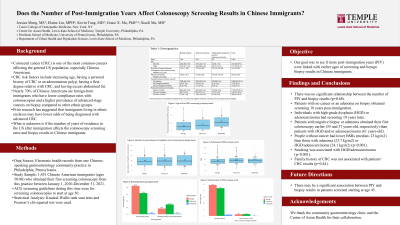Monday Poster Session
Category: Colorectal Cancer Prevention
P2140 - Does the Number of Post-Immigration Years Affect Colonoscopy Screening Results in Chinese Immigrants?
Monday, October 28, 2024
10:30 AM - 4:00 PM ET
Location: Exhibit Hall E

Has Audio
- JM
Jessica Meng, MS
Touro College of Osteopathic Medicine
New York, NY
Presenting Author(s)
Jessica Meng, MS1, Elaine Liu, MPH2, Kevin Tang, MD3, Grace Ma, PhD2, Xiaoli Ma, MD2
1Touro College of Osteopathic Medicine, New York, NY; 2Lewis Katz School of Medicine at Temple University, Philadelphia, PA; 3University of Pennsylvania, Philadelphia, PA
Introduction: Colorectal cancer (CRC) is one of the most common cancers affecting Chinese Americans in the United States. Nearly 70% are foreign-born immigrants with lower compliance rates with colonoscopies and a higher prevalence of advanced stage cancers on biopsy compared to other ethnic groups. Prior research has not analyzed whether the number of post-immigration years in the US affects CRC screening rates. We quantified the number of years between when Chinese immigrants immigrated to the US to when they obtained their first screening colonoscopy to see if this delay in screening affects their colonoscopy biopsy results
Methods: We examined electronic health records of 1451 immigrants who obtained their first screening colonoscopy at a Chinese-speaking gastroenterology practice in Philadelphia, Pennsylvania between January 1, 2010-December 31, 2021. At that time, American College of Gastroenterology (ACG) guidelines recommended CRC screening starting at age 50 in average risk adults. Using Kruskal-Wallis rank sum and Pearson’s chi-squared tests, we analyzed if more post-immigration years (PIY) were linked with earlier ages of screening and benign biopsy results. We also studied if body mass index (BMI), smoking status and family history affected biopsy results.
Results: There was no significant relationship between PIY and biopsy result (P=0.68). Patients who had no cancer or an adenoma on biopsy tended to obtain their first screen 18.4 years after immigrating. Those with high-grade dysplasia (HGD) and/or adenocarcinoma obtained theirs after 20.6 years. Patients without cancer had their first screen at earlier ages (mean: 55 years old [range: 51-61 years old], P< 0.05) compared to those with adenoma (57 years old [52-64 years old]) and HGD/adenocarcinoma (61 years old [56-67 years old]). Patients without cancer had lower BMIs (median [IQR]: 23 kg/m2 [21.2-25.1 kg/m2], P=0.001) than those with adenoma (23.7 kg/m2 [21.9-25.7 kg/m2]) or HGD/adenocarcinoma (24.1 kg/m2 [21.7-25.2 kg/m2]). Smoking was associated with HGD/adenocarcinoma (P< 0.001) but family history of CRC was not (P=0.44).
Discussion: No significant association was found between the number of PIY and biopsy results for first screening colonoscopy. Patients on average were screened 18.5 years post-immigration. Those tested in their fifties tended to have benign biopsies; older patients tended to have HGD/adenocarcinoma. Our findings agree with previous guidelines that CRC surveillance should be performed in people in their fifties.
Disclosures:
Jessica Meng, MS1, Elaine Liu, MPH2, Kevin Tang, MD3, Grace Ma, PhD2, Xiaoli Ma, MD2. P2140 - Does the Number of Post-Immigration Years Affect Colonoscopy Screening Results in Chinese Immigrants?, ACG 2024 Annual Scientific Meeting Abstracts. Philadelphia, PA: American College of Gastroenterology.
1Touro College of Osteopathic Medicine, New York, NY; 2Lewis Katz School of Medicine at Temple University, Philadelphia, PA; 3University of Pennsylvania, Philadelphia, PA
Introduction: Colorectal cancer (CRC) is one of the most common cancers affecting Chinese Americans in the United States. Nearly 70% are foreign-born immigrants with lower compliance rates with colonoscopies and a higher prevalence of advanced stage cancers on biopsy compared to other ethnic groups. Prior research has not analyzed whether the number of post-immigration years in the US affects CRC screening rates. We quantified the number of years between when Chinese immigrants immigrated to the US to when they obtained their first screening colonoscopy to see if this delay in screening affects their colonoscopy biopsy results
Methods: We examined electronic health records of 1451 immigrants who obtained their first screening colonoscopy at a Chinese-speaking gastroenterology practice in Philadelphia, Pennsylvania between January 1, 2010-December 31, 2021. At that time, American College of Gastroenterology (ACG) guidelines recommended CRC screening starting at age 50 in average risk adults. Using Kruskal-Wallis rank sum and Pearson’s chi-squared tests, we analyzed if more post-immigration years (PIY) were linked with earlier ages of screening and benign biopsy results. We also studied if body mass index (BMI), smoking status and family history affected biopsy results.
Results: There was no significant relationship between PIY and biopsy result (P=0.68). Patients who had no cancer or an adenoma on biopsy tended to obtain their first screen 18.4 years after immigrating. Those with high-grade dysplasia (HGD) and/or adenocarcinoma obtained theirs after 20.6 years. Patients without cancer had their first screen at earlier ages (mean: 55 years old [range: 51-61 years old], P< 0.05) compared to those with adenoma (57 years old [52-64 years old]) and HGD/adenocarcinoma (61 years old [56-67 years old]). Patients without cancer had lower BMIs (median [IQR]: 23 kg/m2 [21.2-25.1 kg/m2], P=0.001) than those with adenoma (23.7 kg/m2 [21.9-25.7 kg/m2]) or HGD/adenocarcinoma (24.1 kg/m2 [21.7-25.2 kg/m2]). Smoking was associated with HGD/adenocarcinoma (P< 0.001) but family history of CRC was not (P=0.44).
Discussion: No significant association was found between the number of PIY and biopsy results for first screening colonoscopy. Patients on average were screened 18.5 years post-immigration. Those tested in their fifties tended to have benign biopsies; older patients tended to have HGD/adenocarcinoma. Our findings agree with previous guidelines that CRC surveillance should be performed in people in their fifties.
Disclosures:
Jessica Meng indicated no relevant financial relationships.
Elaine Liu indicated no relevant financial relationships.
Kevin Tang indicated no relevant financial relationships.
Grace Ma indicated no relevant financial relationships.
Xiaoli Ma indicated no relevant financial relationships.
Jessica Meng, MS1, Elaine Liu, MPH2, Kevin Tang, MD3, Grace Ma, PhD2, Xiaoli Ma, MD2. P2140 - Does the Number of Post-Immigration Years Affect Colonoscopy Screening Results in Chinese Immigrants?, ACG 2024 Annual Scientific Meeting Abstracts. Philadelphia, PA: American College of Gastroenterology.
